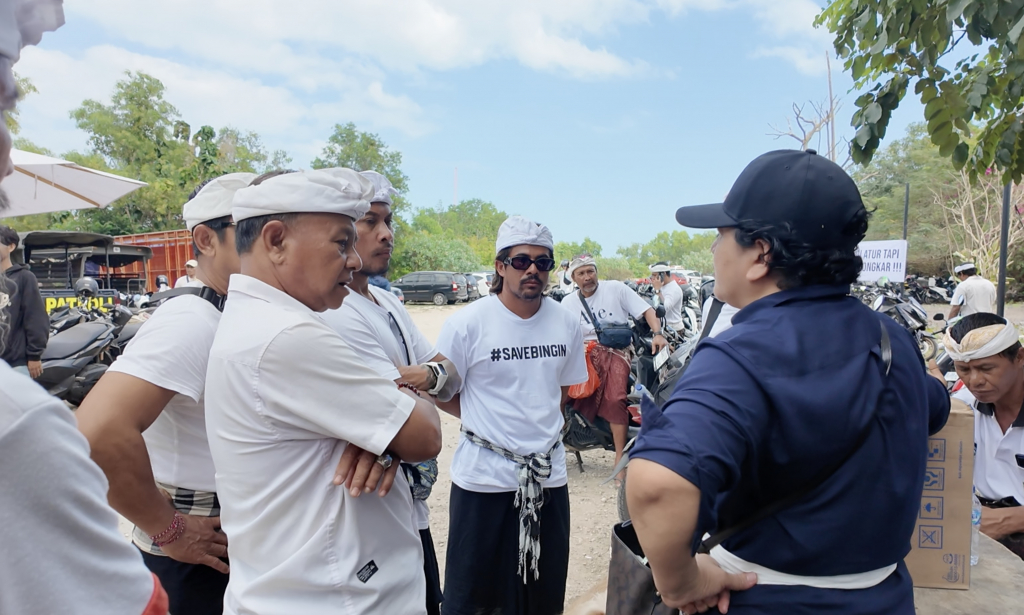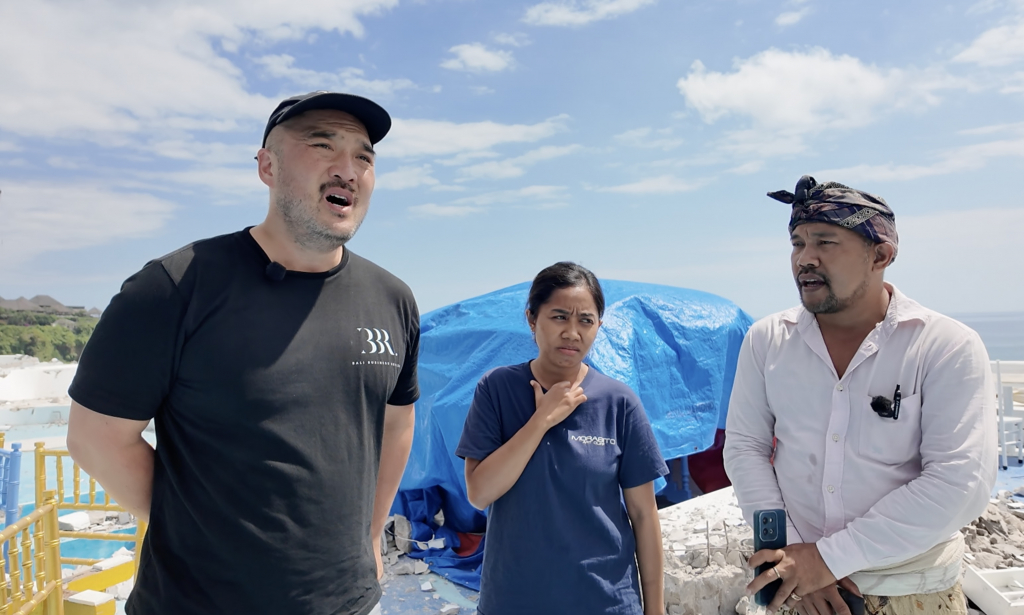On July 21, 2025, the serene cliffside of Bingin Beach was shattered by the sound of excavators as government authorities began a widespread demolition of local businesses. Hey! I’m Jason, a Business Journalist at Bukit Vista, I’ll be unpacking on the Bingin Demolition‘s latest update from Bali Business Review by Jing Cho Yang. In this article, we’ll dive deep into the on-the-ground reality of the community protests, exploring the devastating human and economic costs shared by local business owners and workers. We will also dissect the core legal conflict between national law and traditional hukum adat, and investigate the pervasive rumors that powerful investor interests are the true force behind these. evictions. decisions in this crowded landscape.
Sudden Evictions Spark Community Protest in Bingin Demolition

The morning of July 21st saw a tense atmosphere in Bingin as over 500 personnel, including the civil police unit (Satpol PP), descended to enforce demolition orders on more than 40 businesses lining the iconic cliff. The official reason cited by the Badung Regency government was that the structures violated spatial planning laws and were built on state-owned land without proper permits. For weeks, owners had engaged in negotiations, hoping to halt the process, but the government ultimately proceeded, issuing final warnings via letters, posters, and even WhatsApp messages.
In response, a community of approximately 200 local business owners, staff, and residents gathered in a peaceful protest. Their demand was not for defiance but for dialogue. As Pak Nyoman, a business owner of 30 years, explained, the community seeks fair terms and a reasonable timeline. They have requested a delay of several years to allow businesses to transition, a proposal they believe is fair. The community’s fight for what they see as justice is set to continue, with plans to take their case to the courts. The demolitions have created a scene of chaos and uncertainty, starkly contrasting with the tranquil, relaxed atmosphere that has long drawn tourists to Bingin’s shores.
A Clash of Laws: National Edicts vs. Hukum Adat

At the heart of the Bingin controversy lies a deep-rooted conflict between two legal frameworks: the formal, national law being enforced by the government, and the unwritten, traditional law known as hukum adat. For generations, hukum adat has governed village life, allowing communities to manage their own land and internal affairs. Many of the businesses in Bingin, some operating for over 30 years, were established under this traditional system long before the area became a global tourism hotspot. The government’s sudden enforcement of national spatial planning laws is seen by locals as a betrayal of this long-standing precedent.
This clash raises a critical question: why now? After decades of apparent disinterest from the government, the sudden crackdown feels opportunistic to those affected. Community leaders argue that if they were truly on state land, the government should have intervened decades ago, not after local families had poured their life savings into building the very businesses that made Bingin famous. The government’s actions are perceived as leveraging a legal technicality to dispossess a community that, in their view, has acted as a responsible steward of the land. This conflict highlights a broader challenge across Bali, where rapid development often creates friction between modern regulations and traditional ways of life.
The Shadow of Investor Influence

While the official justification for the demolitions is regulatory compliance, many locals believe there are more powerful forces at play. A pervasive theory among the community is that the government’s actions are being influenced by wealthy investors who wish to clear the land for a large-scale luxury development. Rumors suggest that a major investor has offered the government significant financial incentives, including the promise of higher tax revenues, in exchange for a “blank canvas” on the Bingin cliffside. This narrative of “money talks” resonates deeply with a community that feels powerless against invisible economic interests.
These suspicions have been amplified by the international community, with figures like 11-time world surfing champion Kelly Slater questioning whether the local warungs are being demolished to make way for an exclusive beach club. Although authorities have denied these claims, the fear of privatization is palpable. If a large resort were to be built, many worry it would gate off public access to the beach, fundamentally altering Bingin’s open, bohemian character. While currently unproven, this theory speaks to a widespread anxiety in Bali that local culture and livelihoods are being sacrificed for a model of development that prioritizes foreign capital over community welfare.
The Human and Economic Fallout of the Bingin Demolition

Beyond the legal and political arguments, the human cost of the Bingin demolition is devastating. One staffs raised the concern about the restaurant that, his property in ruins, reported that the evictions left 170 of his staff jobless overnight. He described the immense financial and emotional burden, with families left without income and no alternative employment offered by the government. His plea was not for a handout, but for a solution—a job, a way to continue providing for his family, and a legal path to operate his business. This sentiment is echoed throughout the community, where many feel they have been abandoned by the very authorities meant to protect them.
The economic ripple effect extends to individual workers like Komang Agus, who had worked at a now-demolished restaurant for 16 years. He mournfully recalled the “happier days,” describing the venue not just as a business but as a hub of art and culture that contributed to Bingin’s beauty. Now, he and countless others are jobless, their livelihoods destroyed without warning or compensation. Even tourists have been impacted; one visitor from Germany described her family’s vacation being ruined by the chaos, forcing them to relocate. The demolition has not just erased buildings; it has shattered a community, dismantled a local economy, and left a trail of financial hardship and emotional distress in its wake.
🗒️ Read the transcript
Topic 1: On-the-Ground Report from Bingin
Speaker: Jing (Host)
The host sets the scene on a Monday in the third week of July 2025, where the Bingin community is protesting scheduled demolitions along the cliffside. The goal is to speak with community members and understand the unfolding situation.
Topic 2: A Tourist’s Perspective on the Chaos
Speakers: Jing, Laura (Tourist)
Jing interviews Laura, a tourist from Germany, who came to Bingin for its beautiful views and to relax. She expresses feeling confused and scared by the protests and chaos, stating her family is now moving to a hotel near the airport on their last day to escape the turmoil.
Topic 3: Community Leaders Speak Out
Speakers: Jing, Pak Nyoman, Pak Sallam
Jing sits with community leaders, including Pak Nyoman, a local business owner of 30 years, and Pak Sallam, a famous surfer. Pak Nyoman explains that about 200 people have gathered to protest the government’s demolition policy. Their primary goal is to open a dialogue with the government to negotiate fair terms and delay the demolitions for a few years, giving businesses time to adapt. They plan to take the issue to the court of justice.
Topic 4: The Conflict Between Village Law and National Law
Speakers: Jing, Pak Nyoman
Pak Nyoman questions why the law is suddenly being enforced now that Bingin has become successful. He explains the concept of hukum adat, or traditional village law, which has historically governed the community. He describes the current situation as a conflict where this long-standing village law clashes with newly enforced national law, prompting the need for protest.
Topic 5: Suspicions of Investor Influence
Speakers: Jing, Pak Nyoman, Unnamed Local
Locals express a strong feeling that the sudden enforcement and evictions are driven by powerful investors behind the scenes. They theorize that as the area’s value has grown, outside interests want to push out the local community for “big money,” though they admit this is a theory without concrete evidence. The sentiment “money talks” is used to summarize the situation.
Topic 6: The Human and Economic Cost
Speakers: Unnamed Business Owner, Komang Agus (Worker)
An emotional business owner describes how the demolition destroyed not just his building but all his property, leaving 170 staff members jobless without any solution or alternative employment offered by the government. He emphasizes the broad impact on families and the local economy. Komang Agus, who worked at a restaurant for 16 years, laments the loss of his job and the destruction of a place he remembers as a beautiful cultural and artistic hub. Both express a desire for a legal pathway to operate and a job.
Topic 7: Conclusion and a Call for Transparency
Speaker: Jing (Host)
The host concludes the report by summarizing the day’s events. He leaves it to the audience to form their own opinion on the matter and calls for public discussion. He stresses that greater transparency and a commitment to justice are crucial for investors to feel comfortable and for the future of Bali’s development.
Take the First Step to Joining Our Community, Book Your Seat at Our Round Table Talk Today!
At Bukit Vista, we believe in creating lasting partnerships that help nagivate your property to the top 1% in this competitive season. Join us to discover how we can work together.

